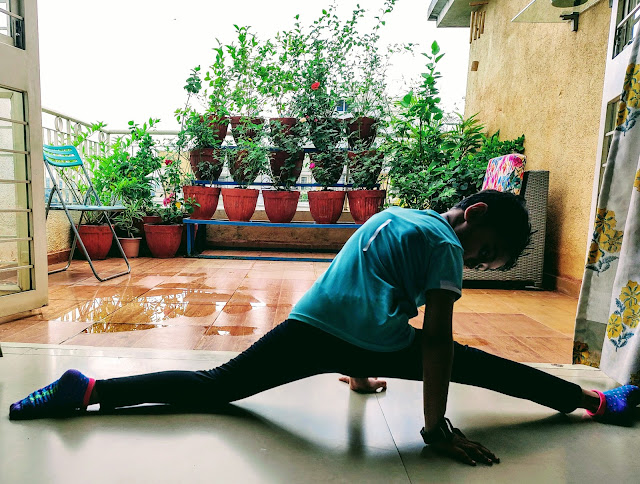Offence or Defence?
An unforeseen advantage of homeschooling in the pandemic is that children have absolutely zero standards or golden rules to apply to their lives. That means that they are not limited by what other kids can or cannot, will or won't, and should or shouldn't do. Today, we changed our running venue to a straighter road, and instead of the regular 5km, I made her run 8km (in 1h13m at slightly over 6.5kmph, which is a reasonable pace for a 6yo's leg length) by convincing her that it is actually slightly shorter than what we do every day in the old place (which was around the building). At the end of it, she was ready for one more round of 2km.
This came as a surprise for me. While in places that she is worse than average in her performance, she may suffer due to lack of competition and peers, in things that she is actually better than average, this allows me to push her further by simply telling her that what she is doing is standard. I have already told her that her next Monday run will be 10km, and that should be something she should be able to do on her off day. She, having nothing to compare this with, agrees.
This fits perfectly well into my style of teaching too. You see, a study which I have forgotten the source of (it was in one of the books that spoke about how the Occidental and the Oriental cultures create different types of students), says that there are two ways to learn something:
- Focus on your weaknesses and areas you fall short in, while working your areas of strength less (because you have only so much bandwidth and resources to devote to it all), so that you become a well-rounded generalist who is a 'Jack-of-all-trades' without really specialising in any one of them. This is usually the Indian (dare I say Oriental?) method. Are you strong in English and weak in Mathematics? Well then, cut down on your English practice and devote it to your Mathematics one. That way, you can learn both, English and Mathematics, at the same level and be able to pass exams. People steeped in this in childhood will take fewer risks and mainly play defence. Such people will do better, on average, in life. They'll study and pass their exams, get a job or join their parents' profession/business, get married, have kids, buy a house and a car, retire with a nest egg, and die peacefully in bed. Their children will mourn them for a few months and then move on.
- Focus on your strengths and screw the weaknesses. By becoming more and more skilled at one or two things at the cost of say, eight or even a thousand other things you are not good at, you are making the best use of your resources and finding your calling (interestingly, this is best described by a Japanese concept, Ikigai, while the West really doesn't have a word for it) which will make your life worth living, though it may not pass you many exams in today's world. People raised in this culture from a young age tend to take more risks and mainly play offence, because they are only operating in a space that they are so good at that they can be aggressive and have stretch goals all the time. Such people will rarely succeed (if success may be defined the way it is generally by society), but when they do, they'll be part of the best there is. Mostly, they won't die, or indeed even live, peacefully. But they'd have a brilliant and eventful life full of interesting things, excitement, passion, and people like themselves. When they go, the world (even if it is a world consisting of a limited number of equally brilliant people) will mourn them and remember them long after they have gone. Also, they will have the most readable (auto)biographies.
I would like to offer the second alternative to my child. To be fair to her, the first one is always available and she may choose, when she can, to go with that one. It is, after all, her life and she can do what she wants and can with it. But if I give her only the first option, instead of the second, she has no choice but to go with it, for while the second type of person may choose to quit and become the first type, it does not work the other way. Many Indians will know this, especially those whose parents and teachers forced them to 'take Science' after 10th standard so that they can always shift to 'Arts' or 'Commerce' later, but won't be able to do it the other way around (why? I have no clue, but that's how our system is rigged).
The idea is to keep pushing Kym's limits and see how far she goes without complaining or quitting. And if she stretches, then keep stretching them (and her) further until she can't. That's where she will discover herself, for only at the very limits of their willingness and ability do humans find their purpose.
#LearningWithKymaia
P.S: Feel free to give me parenting and sports advice. I shall value it to the extent I have paid for it. ;-)


Comments
Post a Comment
Comments to this blog are moderated. Please be patient once you submit your comment. It will appear soon...